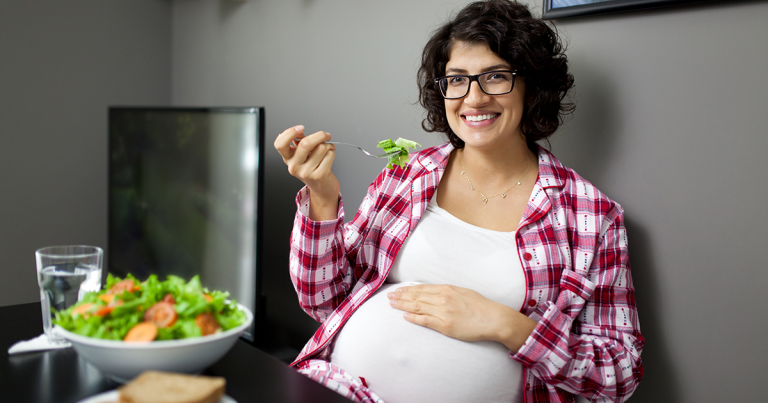
Many women find that their appetites increase while pregnant, and they may even have cravings. But this may leave some wondering: Is this normal?
Weight gain and increased appetite during pregnancy are completely normal and expected. During the second and third trimesters of your pregnancy, you may need an extra 300 calories each day, which is equivalent to a peanut butter sandwich. These extra calorie needs will typically result in a weight gain of about 0.5 to 1 pound each week. However, not every woman will have the same calorie needs during pregnancy. Be sure to check with your health care provider about what rate of weight gain is normal for you.
While pregnant, it’s important to continue to make good nutrition choices to keep you and your baby healthy and strong.
What does a balanced diet look like?
Grains
During pregnancy, you should eat 6 to 9 ounces of grains each day. Grains like bread, tortillas, crackers, rice and pasta are all great choices.
Vegetables
Try to eat 2.5 to 3.5 cups of vegetables. Vegetables can be cooked, raw, or juiced, but be sure to eat a variety of veggies.
Fruits
It’s recommended that pregnant women have 1.5 to 2 cups of fresh fruit, canned fruit or fruit juice daily. However, if you feel that you are gaining weight more rapidly that you want, limit fruit juice to one serving a day.
Dairy
Pregnant women should consume three cups of dairy products each day. This can include cheese, milk, yogurt or ice cream. If you follow a vegan diet or are lactose-intolerant, you can also get the calcium you need from leafy greens such as kale or bok choy, or soy products, including tofu and tempeh.
Proteins
Try to eat 5 to 6.5 ounces of protein each day while you are pregnant. This food group includes cooked lean meats, poultry, fish and eggs, but you can also get the protein you need from plant-based sources like beans or nut butters.
Fats, oils and sweets
Believe it or not, foods often considered unhealthy are also part of a balanced diet when eaten in moderation. You should have 4-6 tablespoons of fats, oils or sweets each day.
Pregnancy cravings
Many women experience cravings during pregnancy, and it’s OK to indulge. But be sure to not replace nutrient-dense foods with junk food in order to satisfy these cravings. If you feel like you are gaining more weight than your provider recommended, there are a few easy switches you can make to cut out “empty calories” (foods that don’t have the vitamins or nutrients you need) that may lead to additional weight gain:
- Replace soda with sparkling water mixed with fruit juice.
- Snack on fruits, nuts or vegetables dipped in yogurt if you are hungry between meals.
- Broil or bake meats instead of frying them.
- Choose low-fat or fat-free versions of dairy products.
Even when eating a balanced diet, your health care provider may recommend that you take a prenatal vitamin to make sure you are getting the nutrients you and your baby need. For more specific questions about weight gain, nutrition, cravings and more, please contact your clinic or health care provider.